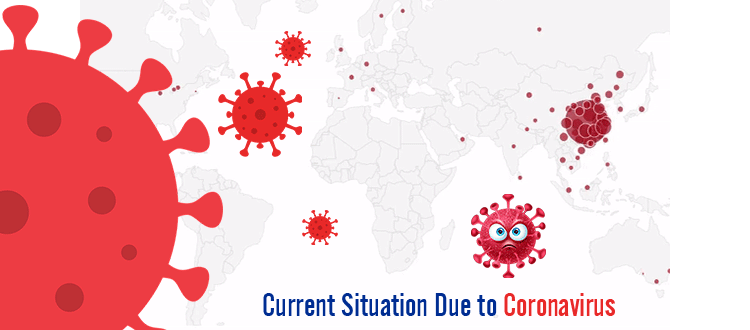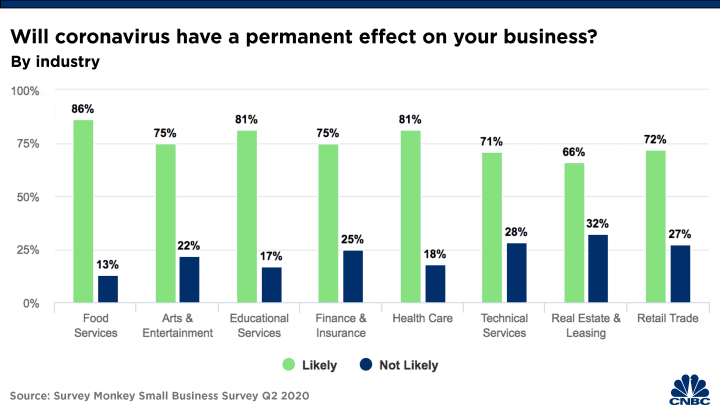On an estimate, the COVID-19 global pandemic has led to the permanent closing of at least a hundred thousand small-time businesses. And the way it is going, and even considering the stats, it is evident that it is not ending any soon. We all are waiting for the COVID-19 pandemic to come to an end. But, it also looks like we are becoming habituated to recent ways, use and recommend online applications, hiring remote app developers for business, and thus helping with COVID-19 second wave survival.
Many companies are reopening after a long break, but not with the same functioning capacity before the lockdown. Even though the scale decreases, a second-wave can put us all down to where we were earlier. This is why being highly cautious is the only option. So, it is crucial to have a plan-B ready if we get hit by another wave. Thus, here is how you can prepare for another business shutdown considering the second wave of COVID-19.
What is the Current Situation Due to Coronavirus?
While I am penning it down, according to COVID-19 stats, it looks like we are away far from the dawn. Around 60-70 thousand new cases are emerging in the USA every day. It is not that every place has been hit the same because it is high in some areas, and it is low in other places. States like CA and NY have a high number of daily cases.
If we consider these statistics, we all will likely witness another mandatory business closure on a large scale. Thus, business owners, especially small business owners, have to be ready for anything. According to a study, it seems like most small business owners are optimistic and are looking forward.
Out of the businesses that shut down earlier, 69% have reopened their business. But, 65% still worry that they may have to shut things down again due to the second COVID wave. This time the closure may even be permanent. 31% of small business people have not taken any steps to be ready for a second closure. Surprisingly, out of those people who don’t think there will be a second shutdown, 45% are not ready for a second closure itself.
Source: CNBC
Citizens need to realize that not only is the second-wave threat real and possible, but it is lingering around our necks. Hoping for the best is a good thing, but one shouldn’t neglect to prepare for the worst. So, here are some approaches for you to be in full preparation for a second shutdown if it occurs.
1. Save Money, Build Reserves
There are high chances of your cash flow interruption in a business, and there is a more significant increase in the opportunity since the COVID-19 pandemic. In such reserves, money reserves will be of great help to you. During the first lockdown, many small-time businesses noticed that they only had enough cash that would help their business survive two weeks. Therefore, you should build your cash reserves to be ready for another COVID-19 wave.
2. Reduce Expenses
Indeed, many small businesses are already operating cautiously and not spending too much. As a business owner, you must ensure no fat in the budget and run as lean as possible. When you reduce expenses, it will help you save money and build up cash reserves.
Furthermore, build a plan in case of a crisis. In such cases, what would your total expense be if you suspend your business operations? And how much funds would you need to cover the costs in such situations? All in all, prioritizing spending only on urgent needs is the ideal way to save money.
3. Relief Funds
Many small business people have taken advantage of relief funds in the US. There are many measures like the Paycheck Protection Program and the Small Business Admin’s Economic Injury Disaster Loan, which proves to be beneficial in the long run. There are numerous such programs available. You can get it through the local, state, or national government, and even private or non-profit organizations.
4. Find Different Sources of Income
You are highly lucky if your business has an alternate stream of revenue during the pandemic. Thus, it would help if you consider investing in that stream’s growth because things are not going to change soon. And for those who do not have an alternative, it is high time you start searching for other options. Customers are always in need of something; you should plan about the different approaches you can take to fulfill them like creating an app like Amazon, fantasy apps like Dream11, etc.
Brands have a customer base. They need a little tweaking to get back in touch with their clientele wherever they are. For instance, you can start with online sales. It is what customers are resorting to during the global pandemic period. Or if you have a restaurant, you can focus more on takeouts and no-contact deliveries. These ways are more in demand and can help you get back to normal easily with passing time. Similarly, you can find out new ways for your business. You need to be creative and patient enough to find the ideal methods.
5. Remote Work
Remote work has become the most vital thing for almost all businesses in the pandemic. The companies that can operate effectively from a distance have suffered minimum losses. So, if you transitioned your business into a remote approach, you should consider making it permanent. If that is not the case, or if switching to remote work was difficult for you, you should evaluate where things went wrong and try to fix things.
Most businesses shifted in one way or another from traditional to online during the first few months of the lockdown. It is now time to see what helps and what doesn’t in the period. You should consider putting the things that work into effect and discard the things that did not. This investment will mainly help and determine whether the business will be continuing or closing down.
6. Be in Touch with your Employees and Clientele
It is essential to keep your employees and customers filled in with your operations’ details and plans. It is necessary, but even your clients and employees look up to your business for support at difficult times. You should be able to help them out in the most convenient way.
Two things are highly crucial for a business: A disaster management plan and a crisis team to execute the plan. And companies can only make it happen successfully with the help of proper communication. Thus, businesses must communicate with their employees and clientele regularly.
And no matter what your scenario is, you must put up a backup plan in order even if there is no high risk of a second-wave closure in your area. If you have a plan in order, it will always be beneficial to prepare you in advance for any natural disaster or any such things in the future.
What is the Effect of the Global COVID-19 Outbreak on Small or Startup Businesses?
Since the start of the outbreak, it was quite clear that COVID-19 will severely impact small businesses. It affected to the extent that many bright entrepreneurs had to close their doors for once and for all.
According to a survey back in March, when the whole situation was new, it was found out that around 37% of small businesses wouldn’t be able to survive the pandemic even for a month. Companies won’t be able to last if they do not have assistance. Furthermore, 24% of small businesses were able to manage for a minimum of two months.
Additional findings were that the biggest hurdle to overcome the pandemic was the cash flow. On average, businesses with a monthly expense of 10 thousand USD only had cash that could keep them above the water for two weeks. That is if they do not have any guidance. All in all, cash flow directly impacts a company’s optimism considering its ability to survive the pandemic.
A majority of businesses were already expecting the shutdown to end by the mid of June. While some companies are running again as of now, some are about to start within some days. At the same time, some businesses have made up their mind to go out of business for good.
How Many Businesses Died Out Due to COVID-19?
It is relatively challenging to point out the exact number of businesses that shut down. Anyhow, on the estimate, nearly one hundred thousand small businesses are non-functioning due to COVID-19. It also differs from sector to sector. For instance, hotels have been severely impacted. As of now, approximately sixteen thousand bars and restaurants have shut down once and for all. There is also a drastic incline in unemployment. In the USA, there were around 6.2 unemployed people in Feb 2020. In May, the number went up to a whopping 20 million.
Conclusion
One thing to learn from the global pandemic is that small businesses must be ready to face an unexpected situation. Furthermore, entrepreneurs need to be very careful with the preparation because it decides whether your business will survive the pandemic or shut down for good.

My name is Nicolas Thomas. I am Managing Director and Co-Founder of Indian App Developer, leading Software and Mobile App Development Company India. My ideology is that a clear vision and hard work build a great company. I started my career in Information and Technology 10 years back as a new-age Entrepreneur in emerging digital India.













